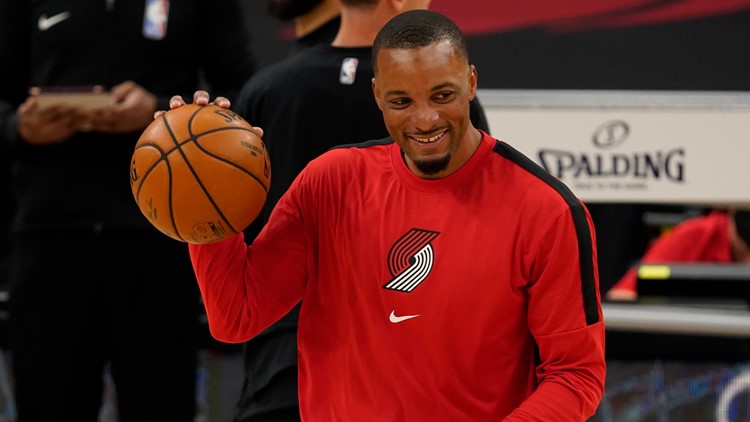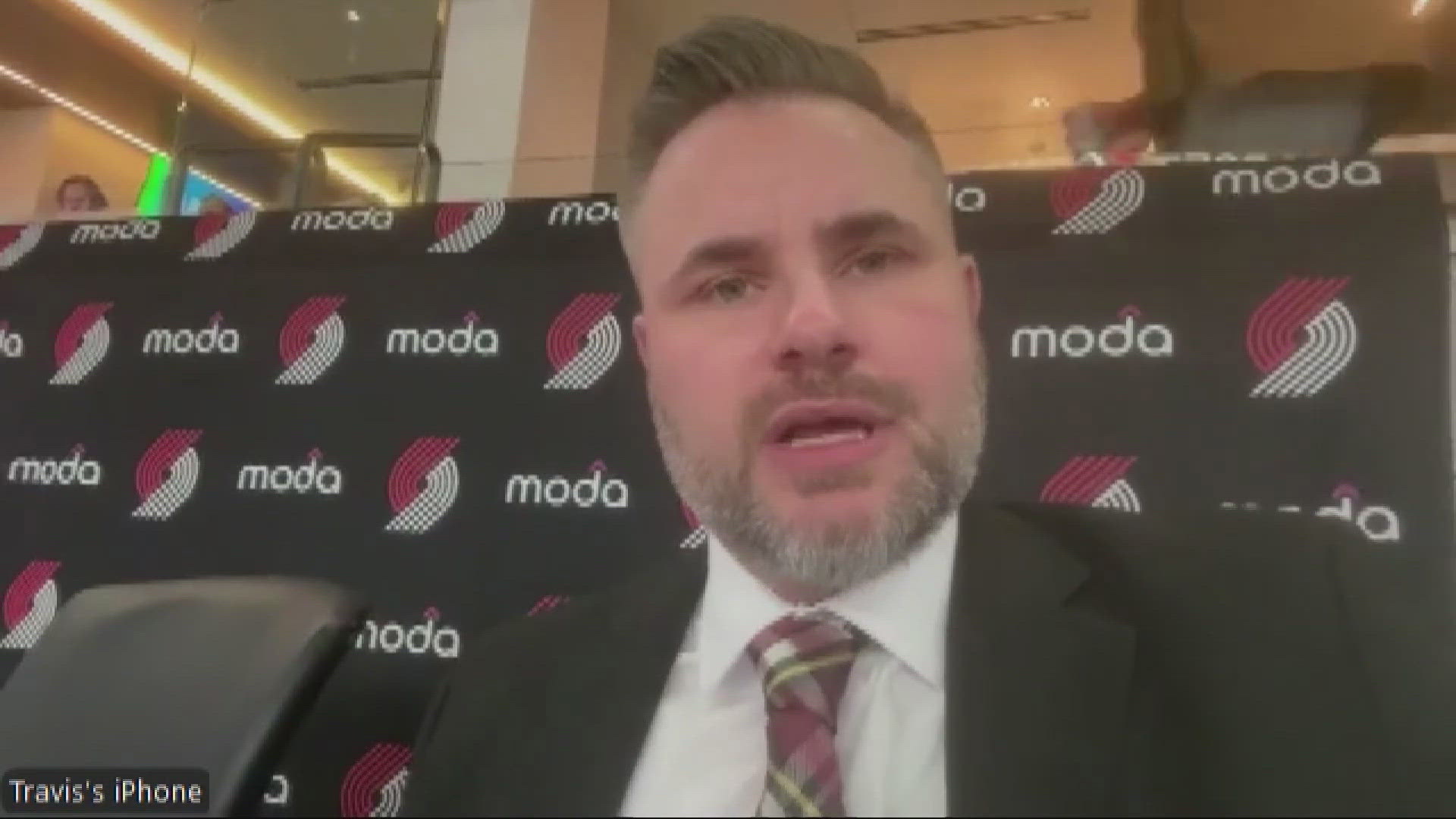PORTLAND, Ore. — NBA free agency tipped off Monday afternoon and the Portland Trail Blazers didn't take long to secure their top priority in free agency, resigning free agent guard Norman Powell to a five-year, $90 million contract. The Blazers also shored up their bench depth, signing backup center Cody Zeller and backup wings Tony Snell and Ben McLemore.
This came after the Blazers made a trade last week to move into the second round of the NBA draft and select Greg Brown from Texas with the 43rd overall pick. Brown, 19, was widely regarded as one of the Top-10 prospects in the high school class of 2020. As a freshman at Texas, the 6-foot-9 forward averaged 9.3 points and 6.2 rebounds in 20.6 minutes per game with the Longhorns his freshman season.
3-ON-3 BLAZERS PODCAST: With Norman Powell re-signed, is a big trade on the horizon?
Here's a look at each move the Blazers have made since free agency began on Aug. 2:
Norman Powell resigns with Blazers
The Blazers identified resigning Norman Powell as their top priority in free agency and got the deal done hours after free agency began, agreeing to a five-year, $90 million deal to bring the sharp-shooting wing back to Portland.
Powell's $18 million annual salary in his new deal is similar to what other wings signed for this offseason, including former Blazers guard Gary Trent Jr., who re-upped with the Toronto Raptors for three years, $54 million ($18 million annually).
In addition, Evan Fournier signed with the New York Knicks for four years, $78 million ($19.5 million annually), Tim Hardaway Jr. resigned with the Dallas Mavericks for four years, $74 million ($18.5 million annually) and Duncan Robinson resigned with the Miami Heat for five years, $90 million ($18 million annually).
The Blazers traded Trent Jr. for Powell at last season's trade deadline and Powell made an impact for Portland down the stretch. Starting out of position at small forward, the 6-foot-3 guard averaged 17.0 points in 34.4 minutes per game for the Blazers. He shot 36.1% from the 3-point line for the Blazers after shooting 43.9% for the Raptors before the trade. He's a career 37.7% 3-point shooter. In Portland's first-round loss against the Denver Nuggets, Powell averaged 17.0 points and shot 38.5% from 3.
Does resigning Powell mean a trade of CJ McCollum is more likely?
If the Blazers plan to pursue a trade of starting shooting guard CJ McCollum this offseason, resigning Powell was a necessary first step in that process. If McCollum is traded, Powell can slide over to his natural position and start at shooting guard for the Blazers. Without Powell, the Blazers don't have a suitable replacement for McCollum.
Earlier this offseason, Sports Illustrated's Chris Mannix reported that McCollum has been told he's not getting traded this offseason. He doubled down on that Monday, reporting that "the Blazers have shown no inkling they intend to move on from Damian Lillard or C.J. McCollum."
RELATED: NBA free agency day 1 winners and losers: Heat score big, Blazers not doing much to keep Lillard
Jason Quick of The Athletic reported two weeks ago that teams reached out to the Blazers about trading for McCollum before the draft, "offering Portland a chance to get into the top part of the draft," but the Blazers turned down those offers. Quick reported that "it appears Portland is headed toward having the same starting lineup with a different supporting cast," meaning McCollum would not be traded and will return to Portland for his ninth season with the Blazers.
Another report, from Bleacher Report's Jake Fischer on July 31, said that the Blazers and Raptors engaged in trade talks centered around McCollum and forward Pascal Siakam, "though talks between the teams have yet to generate significant momentum."
Backup center Cody Zeller
Portland signed Cody Zeller to a one-year deal for the minimum, which is undeniably a good deal for the eight-year veteran. John Hollinger of The Athletic has a tool called BORD$ that projects a player's value for the coming season. It set Zeller's value at $6.1 million. Bobby Marks of ESPN had his salary projected between $4 and $6 million. To get Zeller on a veteran's minimum deal that costs the Blazers $2.4 million (but only counts $1.7 million against the cap) is a good deal.
As for the fit on the court, the 28-year-old is a good backup center when he can stay healthy. That's the big question mark with Zeller. In eight seasons, all with Charlotte, Zeller has missed an average of 22 games per season. Last season, he played just 48 games.
When Zeller is on the court, he's good. For his career, the 6-foot-11 center has averaged 8.7 points and 6.0 rebounds in 22.7 minutes per game. Last season, he averaged 9.4 points and 6.8 rebounds in 20.9 minutes per game. "Zeller is one of the league's most physical players, screening the crap out of people, leaning on opposing bigs and winning battles on the glass," Hollinger wrote. Zeller can score in the post, is a good passer and a solid defender.
Backup guard Ben McLemore
The Blazers signed Ben McLemore to a one-year veteran's minimum contract. McLemore, 28, is a 6-3 shooting guard whose main skill is outside shooting.
A career 36.3% shooter from 3 over his career, he had his best season two years ago with the Rockets when he averaged 10.1 points and shot 40% from 3 in 22.8 minutes per game. Last season, he slumped, shooting 33.1% from 3, leading Houston to buy him out after 32 games. He finished the season with the Lakers and averaged 8.0 points and shot 36.8% from 3 in 17.5 minutes per game.
McLemore's not a good defensive player but as a volume 3-point shooter who hits them at a pretty good clip, he has value. Surprisingly, Hollinger's BORD$ tool set McLemore's value at $6.3 million, which makes this is another quality low-risk signing at the minimum for the Blazers.
Blazers wing Tony Snell
Last season, Snell shot 56.9% from 3 for the Hawks, but he didn't shoot them at high volume (only 2.3 attempts per game), which lessens the impact of that kind of shooting. That said, Snell has been a good 3-point shooter throughout his career, hitting 39.7% from distance over eight seasons.
At 6-foot-6 and 213 pounds, Snell projects as a wing who can both shoot the ball and defend, but his reputation as a solid defender isn't really backed up by analytics, especially last season. He ranked 47th among small forwards in ESPN's defensive real plus-minus at -0.70 and 538's RAPTOR ranked him 214th overall in defensive RAPTOR at -1.9.
But on a minimum one-year deal, getting an elite stand-still 3-point shooter for the end of the bench is another acceptable low-risk signing for the Blazers.
What's next?
The Blazers still have their most valuable chip in free agency, the taxpayer's midlevel exception of $5.89 million. A player to watch for with that exception is veteran power forward Paul Millsap, whom the Blazers pursued last offseason in free agency before he opted to return to the Denver Nuggets. Millsap is 36 but would be a quality veteran backup at a position of need for the Blazers.
With the four free-agent signings and rookie Greg Brown, Portland has 13 of its 15 positions on its active roster locked up. Whether the Blazers will carry more than the required 14 positions remains to be seen. But if Portland uses its taxpayer midlevel exception to sign one more player, that may be the end of Portland's maneuvering in free agency.
The Blazers' summer-league roster also includes several veterans, including Emmanuel Mudiay, Kenneth Faried and Michael Beasley. It's possible the Blazers could invite one or all of those players to training camp in the fall and give them a chance to make the team.
Trades are the final, most impactful avenue for the front office to improve the roster this offseason. Whether the Blazers will trade McCollum or anyone else on its roster before the start of next season remains to be seen. The 2021-22 regular season begins Oct. 19.
3-ON-3 BLAZERS PODCAST: With Norman Powell re-signed, is a big trade on the horizon?



